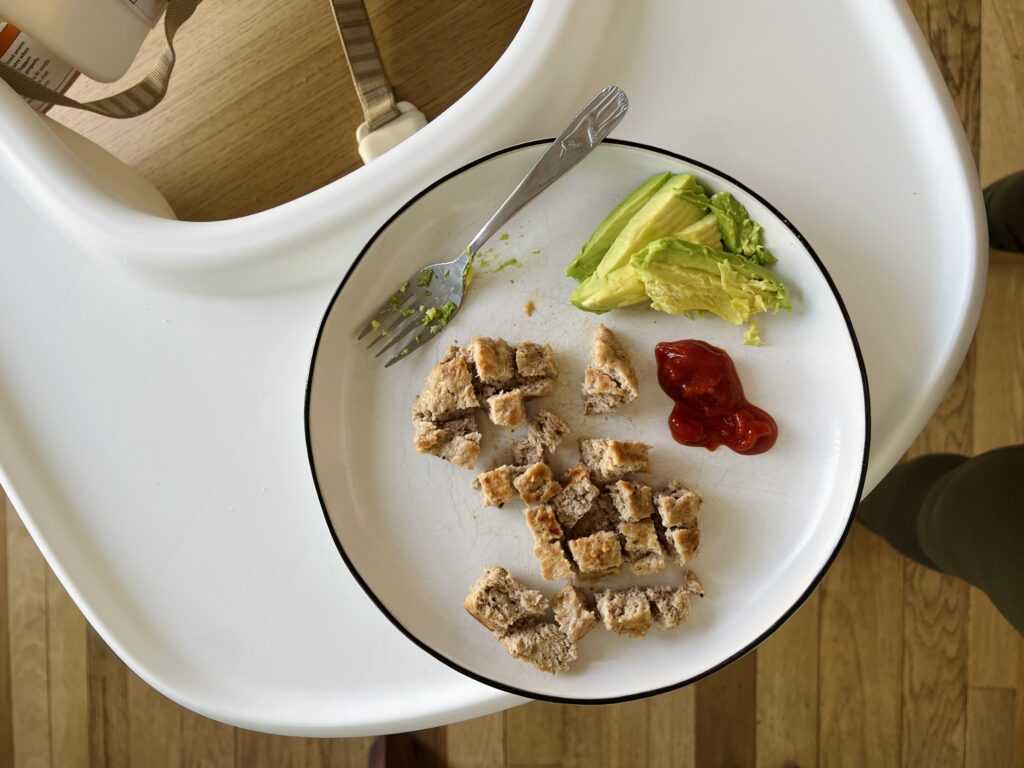One of the most powerful things we can glean from our children is how in-tune they are with their hunger cues. They’re intuitive eaters. And while their particularness can certainly be frustrating, it’s our responsibility to model healthy behaviors around food—including staying calm when they refuse to eat what’s for dinner. Ultimately, when given the space to eat unconditionally, they can develop a healthy relationship with food. And this can have a positive, lifelong impact. Because as many of us know, a negative relationship with food can lead to an everlasting struggle with body image, self-confidence, and weight. But by encouraging your kids to foster a natural, trustful relationship with food, maybe you’ll find healing for yourself, too. Today, we’re diving into tips for how to raise a normal eater, along with a few helpful book recommendations.
We are all born as intuitive eaters
It’s important to remember that nobody is born with a disordered relationship with food. It’s learned. As parents, we have a constant influence over the way our kids view food (and their bodies). It’s our responsibility to help cultivate a healthy relationship with food—from the start. We are all born with the skill to eat when we’re hungry, stop when we’re full, and choose satisfying foods. We’re inherently self-regulators, and this is our default mode. Unfortunately, that can change as we grow up. A lot of factors influence this, including social media, what kids hear on the playground, and of course, what parents are instilling in their children.
encouraging kids to have a relaxed approach to food
After working with clients for over five years, many adults have—or have had—a disordered relationship with food. And it’s not hard to see why. Our society puts thinness on a pedestal, equating a small body with health. This obsessiveness with food and body has led to universal struggles with guilt, fear, and anxiety around food. But we can be better for our kids—we can do our best to limit diet culture messaging in our homes. In turn, we can foster an easygoing, relaxed attitude toward food. This will encourage our children to make food choices without agonizing over ingredients or calories.

What Nutrients do Kids need to be healthy?
There’s a delicate balance between offering our children nutrient-dense foods and giving them opportunities to eat anything and everything, including sugar. But we before we get into tips for how to raise a normal eater, it’s helpful to have a general understanding of what fuels their growing bodies.
IRON
Iron helps move oxygen from the lungs to the rest of the body. It’s essential! It’s best to turn to iron-rich, real food sources to help meet your toddler’s need for iron. Iron is available in two forms: Heme and non-heme. Heme is found in meat, seafood, and poultry. It’s more absorbable than non-heme iron (plant-based sources of iron, like lentils, beans, tomato puree, and quinoa).
OMEGA-3 (DHA)
As a whole, healthy fats are vital for infants, babies, and toddlers. They protect major organs, increase nutrient absorption, prevent constipation, and stabilize blood sugar. And of course, they keep toddlers full and satisfied. If your little one is vegan or mostly plant-based, my recommended plant-based source of DHA supplementation is marine algae.
VITAMIN D3
Vitamin D is important for a toddler’s growing bones, immunity, and ore. Food sources of vitamin D for your toddler include cod liver oil, salmon, mackerel, herring, egg yolks, and beef liver. It’s best to supplement vitamin D, however, as food sources alone aren’t enough.
CHOLINE
Choline is not a widely recognized nutrient, but it plays a crucial role in infant development! It supports brain development, enhances the memory, improves cognitive function, and more. Food sources of choline include eggs, liver, salmon, beef, beans, lentils, and plain yogurt.
CALCIUM
Like vitamin D, calcium is vital for building strong bones and teeth. For optimal absorption, pair foods with calcium with fat. Toddler-friendly foods with calcium include plain yogurt, canned sardines (mashed with avocado), kefir (add to a smoothie), salmon, chia seeds, tahini, and spinach.
PROTEIN
Protein is essential for your toddler’s growth, maintenance, and more. Of all the nutrients toddlers need to be healthy, protein is key! It contains many nutrients that are needed for your child’s health. Protein can come from animal or plant-based sources.
For an extended version, click here to read my guide on toddler nutrition. If you currently have a baby, click here for baby nutrition.

5 tips for How to Raise a normal eater
While normal looks different for everyone, the gist is to raise children to have a mindful yet enjoyable (read: stress-free!) relationship with food.
strive to be a positive role model
Did your mother embark on a restrictive diet and vigorous exercise program when you were little? And did you internalize that as such: larger bodies were wrong and something to be ashamed of? Inevitably, this likely impacted your relationship with food and body image. All of that to say, children model what they see and hear. Monkey see, monkey do. If you struggle with a healthy relationship with food, you might find it difficult to model that for your children. And that’s okay. A wonderful place to start is to not see our bodies as an enemy. Rather than strive for body positivity, strive for body neutrality around your kids. Sometimes, saying nothing is better than saying something. After all, how you regard your body will influence your child’s perceptions about “good” bodies, and how their own bodies compare to this standard. If you need help doing internal work, reach out to me.

try not to use Food as a Reward or Punishment
This is one is easier said than done (at least in my experience). Have you ever found yourself saying, “You can’t have ice cream unless you eat your broccoli,” or “If you misbehave, you can’t have a cookie.” Been there, done that. Using food as a reward—or punishment—is so tempting. But the problem with this is that it automatically deems certain foods are good and others are bad. Children see certain foods as more desirable and the must-eat foods as something to be avoided. Non-food rewards, like special activities or a day out with a parent, can be just as effective. Not using food as reward or punishment also avoids putting foods into boxed categories—a mentality that can carry over into adulthood.

Let Go of the clean plate club
Many of us grew up with the idea that we always had to finish our plates. The problem with this is that it forces kids to ignore their internal signals of fullness. Instead of being able to explore and enjoy the foods in front of them, children feel like they need to eat everything on their plate—often, to move onto dessert. Again, remember that children are inherent intuitive eaters. They know when they are hungry and when they are full. They might gravitate toward some foods more than others, and in that case you can explore more foods, together.
Although some picky eating is common, extremely picky eating that persists for several months or more could be a sign of disordered eating. Parents who have concerns about their child’s eating patterns should consult a pediatrician or another health professional.
Prioritize Family Meals
Family meals are crucial for how to raise a normal eater. After all, they protect against disordered eating. Planning family meals with busy schedules can feel impossible—therefore, aim to eat together as often as possible, even if it’s not every night. Take the time to enjoy each other’s company, try new foods, and even cook together. Speaking of, involve your kids in the shopping and cooking process! This is a wonderful way to build family relationships, honor cravings, and more.

Be Weight Neutral With Children
Studies show that being teased and bullied as a child impacts an adult’s food and lifestyle choices. And their mental health (not surprising). Rather than focus on a child’s size, which can (and will) change over time, try to be neutral. Note the diversity of bodies and how they naturally come in different shapes and sizes. Encourage children to eat a variety of foods, and encourage them to do physical activities that bring them joy.
3 Books to help raise normal eaters
Along with implementing these aforementioned strategies, consider reading a book or two on raising mindful, intuitive eaters. These are the best books for how to raise a normal eater.
how to raise a mindful eater
The book pinpoints powerful principles that give you the best shot at raising a mindful eater, someone who listens to their body, eats for nourishment and enjoyment, and naturally eats in moderation.

A parent’s guide to intuitive eating
This book breaks down intuitive eating in a way that’s easy to understand and even easier to implement. It offers a system that builds healthy habits and better mindsets that will last a lifetime. Through the techniques and tips in this book, you’ll discover how to eliminate stress, anxiety and food battles and instead enjoy feeding your confident eater!

How To Raise an Intuitive eater
How to Raise an Intuitive Eater is the only book of its kind to teach parents what they need to know to improve health, happiness, and wellbeing for the littlest among us. It inspires parents to raise children to be competent, healthy eaters—living their best lives in the bodies they were born to have.

This article contains affiliate links. Thank you for supporting Wellness with Edie!
This is for informational purposes only. It is not, nor is it intended to be, a substitute for professional medical advice, diagnosis, or treatment and we recommend that you always consult with your healthcare provider.



Leave a Reply